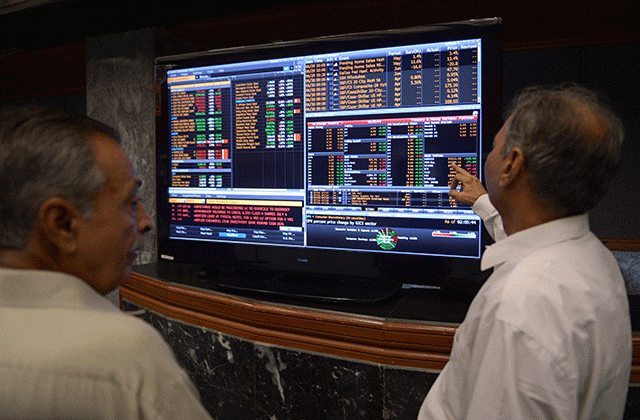PSX: the goose that laid the golden eggs
Barring the first budget, the PML-N has sharpened its knife on stock market every year

PHOTO: AFP
The PML-N would take solace from the fact that its tenure saw the index climb from 21,059.30 points at the end of fiscal year 2012-13 to 45,452.98 at the end of trading on April 23, 2018. This is a whopping 115.8% return, roughly meaning that a stock market investor’s wealth doubled during the five years.
Slapping the goose with taxes
In return, the PML-N slapped its goose that laid the golden egg with high amounts of taxes. The rate of Capital Gains Tax (CGT) – a tax on the gain made from the sale of shares – was increased across all budgets except the first one (for fiscal year 2013-14). The distinction between filers and non-filers was also made more pronounced, and tax rates on dividend income as well as bonus shares was increased as the PML-N battled low revenue and fiscal deficit.
While the stock market was able to absorb the initial shocks during the subsequent three years, emerging as Asia’s top performing market in calendar year 2016, the following months would prove to be one of the most disastrous ones for the PSX.
On strong expectation that Pakistan would attract huge inflows after being upgraded to MSCI’s Emerging Markets status, the KSE-100 climbed beyond the 50,000-point mark. Then came the fall.
The euphoria over MSCI inclusion prompted then finance minister Ishaq Dar to increase CGT rates as he sharpened his knife on Asia’s top performing market. If that wasn’t enough, Nawaz Sharif’s disqualification as prime minister, lower-than-expected inflows after MSCI’s inclusion, and worrying economic indicators took their toll to bring an end to the PSX’s spectacular rise.
For the ongoing fiscal year, CGT rates were increased and the government did away with holding periods of up to five years. Tax was brought to an even 15% for filers, and 20% for non-filers of income tax returns. For holding periods beyond five years, tax was exempted.
Dar did this in contradiction to PSX budget proposals for 2017-18 that urged the finance ministry to revise down the various CGT rates for different holding periods.
Perhaps, it is then just ironic that the PSX lost its shine, and was unable to contribute as much CGT as originally planned.
According to various market players, the budget measures prompted investors to sell shares before the new fiscal year began, causing a massive bearish streak at the bourse.
The benchmark index lost a massive 28.28% in the aftermath of combo of events, landing at 37,919.42 points on December 19, 2017 from its all-time high of over 52,876.46 in May 2017. Despite a notable recovery in the remaining days of December, the PSX emerged as the world’s worst stock market in 2017 with a net 15% drop (20% in dollar terms).
Trading volume has taken a hit and has yet to pick up.
On the other hand, the index has increased almost 20% since December 19, but a huge part of the climb is due to the two-part rupee devaluation that has weakened the rupee by over 9% against the US dollar.
The run has also come in hope that the government would rationalise tax rates in the upcoming budget, and abolish tax on bonus shares.
The government’s view
Authorities claim the CGT imposition was aimed at ending speculative trading and encouraging long-term investment at the PSX. Analysts, however, argue that 'speculation' remains a useful tool and keeps a stock market vibrant.
BMA Capital's analyst Fawad Khan says the uniform CGT rate (15%/20%) is harsh.
“A uniform tax rate is imposed in developed markets regardless of the investment horizon. The PSX is still in a developing stage where investors should be encouraged to hold shares for longer periods. For the purpose, it is necessary to reduce CGT rates progressively with respect to the holding periods.
"The government is expected to rationalise CGT rates. It is also expected that tax on bonus shares would be rationalised and tax on dividend would be removed."
Other taxes
Budgetary measures that kept increasing the cost of investment during the last five years include:
In 2014-15, the government mandated that bonus shares be treated as dividend and a tax be applied at 5% of the ex-bonus price of shares.
Tax rate on dividend income has kept increasing in each budget from 10% (filers) and 15% (non-filers) collected in fiscal year 2014-15 to 15% (filers) and 20% (non-filers) at present.
In 2015-16, super tax was imposed at the rate of 4% for banks and 3% for other companies that had an annual profit of Rs500 million or more. The tax was initially imposed as a one-time measure, but has remained in effect to day. Several companies listed on the PSX are fighting court battles in a bid to have the super tax overturned.
The corporate tax rate of 35% in fiscal year 2012-13 has been reduced by one percentage point each year since 2013-14. This is the one positive tax measure the PML-N has taken in the last five years.



















COMMENTS
Comments are moderated and generally will be posted if they are on-topic and not abusive.
For more information, please see our Comments FAQ